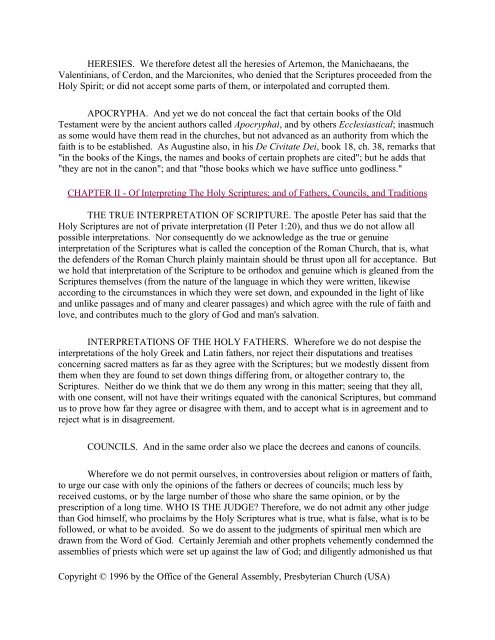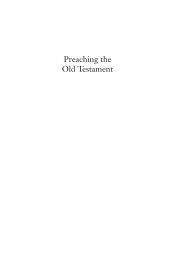The Book of Confessions - The Presbyterian Leader
The Book of Confessions - The Presbyterian Leader
The Book of Confessions - The Presbyterian Leader
Create successful ePaper yourself
Turn your PDF publications into a flip-book with our unique Google optimized e-Paper software.
HERESIES. We therefore detest all the heresies <strong>of</strong> Artemon, the Manichaeans, the<br />
Valentinians, <strong>of</strong> Cerdon, and the Marcionites, who denied that the Scriptures proceeded from the<br />
Holy Spirit; or did not accept some parts <strong>of</strong> them, or interpolated and corrupted them.<br />
APOCRYPHA. And yet we do not conceal the fact that certain books <strong>of</strong> the Old<br />
Testament were by the ancient authors called Apocryphal, and by others Ecclesiastical; inasmuch<br />
as some would have them read in the churches, but not advanced as an authority from which the<br />
faith is to be established. As Augustine also, in his De Civitate Dei, book 18, ch. 38, remarks that<br />
"in the books <strong>of</strong> the Kings, the names and books <strong>of</strong> certain prophets are cited"; but he adds that<br />
"they are not in the canon"; and that "those books which we have suffice unto godliness."<br />
CHAPTER II - Of Interpreting <strong>The</strong> Holy Scriptures; and <strong>of</strong> Fathers, Councils, and Traditions<br />
THE TRUE INTERPRETATION OF SCRIPTURE. <strong>The</strong> apostle Peter has said that the<br />
Holy Scriptures are not <strong>of</strong> private interpretation (II Peter 1:20), and thus we do not allow all<br />
possible interpretations. Nor consequently do we acknowledge as the true or genuine<br />
interpretation <strong>of</strong> the Scriptures what is called the conception <strong>of</strong> the Roman Church, that is, what<br />
the defenders <strong>of</strong> the Roman Church plainly maintain should be thrust upon all for acceptance. But<br />
we hold that interpretation <strong>of</strong> the Scripture to be orthodox and genuine which is gleaned from the<br />
Scriptures themselves (from the nature <strong>of</strong> the language in which they were written, likewise<br />
according to the circumstances in which they were set down, and expounded in the light <strong>of</strong> like<br />
and unlike passages and <strong>of</strong> many and clearer passages) and which agree with the rule <strong>of</strong> faith and<br />
love, and contributes much to the glory <strong>of</strong> God and man's salvation.<br />
INTERPRETATIONS OF THE HOLY FATHERS. Wherefore we do not despise the<br />
interpretations <strong>of</strong> the holy Greek and Latin fathers, nor reject their disputations and treatises<br />
concerning sacred matters as far as they agree with the Scriptures; but we modestly dissent from<br />
them when they are found to set down things differing from, or altogether contrary to, the<br />
Scriptures. Neither do we think that we do them any wrong in this matter; seeing that they all,<br />
with one consent, will not have their writings equated with the canonical Scriptures, but command<br />
us to prove how far they agree or disagree with them, and to accept what is in agreement and to<br />
reject what is in disagreement.<br />
COUNCILS. And in the same order also we place the decrees and canons <strong>of</strong> councils.<br />
Wherefore we do not permit ourselves, in controversies about religion or matters <strong>of</strong> faith,<br />
to urge our case with only the opinions <strong>of</strong> the fathers or decrees <strong>of</strong> councils; much less by<br />
received customs, or by the large number <strong>of</strong> those who share the same opinion, or by the<br />
prescription <strong>of</strong> a long time. WHO IS THE JUDGE? <strong>The</strong>refore, we do not admit any other judge<br />
than God himself, who proclaims by the Holy Scriptures what is true, what is false, what is to be<br />
followed, or what to be avoided. So we do assent to the judgments <strong>of</strong> spiritual men which are<br />
drawn from the Word <strong>of</strong> God. Certainly Jeremiah and other prophets vehemently condemned the<br />
assemblies <strong>of</strong> priests which were set up against the law <strong>of</strong> God; and diligently admonished us that<br />
Copyright © 1996 by the Office <strong>of</strong> the General Assembly, <strong>Presbyterian</strong> Church (USA)




